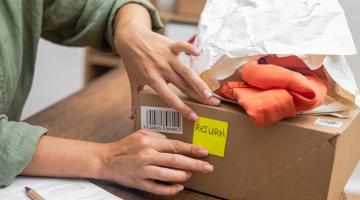
View Retailers Reaching for Net-Zero (members-only).
NRF has released a guide to help retailers clarify and prioritize their response to climate change. “Retailers Reaching for Net-zero” provides an overview of the science, highlights the business case for taking action and describes a framework for setting science-based greenhouse gas emission targets. It also includes observations and lessons learned from leading retailers.
As the guide documents, climate change is already affecting retailers. More intense storms, forest fires, flooding, power outages and other climate-related impacts are disrupting retail operations, including supplier operations deep within supply chains.
While more than three dozen retailers have announced or committed to developing science-based climate targets, some retailers are relatively early in their sustainability journey. Some have more sophisticated sustainability strategies, while others are unclear where they are along the sustainability continuum.
The retailers that participated in the development of the NRF guide see value in consolidating their experiences to help other industry members understand how each retailer’s efforts compare with industry peers.
Given growing interest from investors, regulators, supply chain partners, employees and consumers seeking to understand how retailers are responding to climate change, contributors to the guide see value in providing clarity around terms and approaches. They believe adopting a common framework and the highlighted practices can generate long-term benefits for the retail industry and individual retailers.
Participating retailers ensured that the guide includes clear definitions for terms like “net-zero” and “carbon neutral.” They also emphasized the importance of developing appropriate baselines, pragmatic short-term and long-term greenhouse reduction goals, meaningful metrics and standardized reporting approaches.
The NRF net-zero guide adopts the framework developed by the Science Based Targets initiative, which is being used by more than 2,250 companies worldwide. The framework, adapted to meet retailer needs, highlights the following steps:
- Quantify current emissions, including scope 1, 2 and 3 emissions
- Set science-based targets aligned with the SBTi
- Prevent, reduce and eliminate greenhouse gas emissions to get to net-zero
- Engage externally by reporting targets and progress and supporting others to do the same
Importantly, the guide also highlights the business benefits of understanding and reducing greenhouse gas emissions. NRF members identify several benefits, including:
- Cost savings — reducing energy use and waste handling
- Risk reduction — addressing consumer, investor and regulatory concerns and understanding supply chain vulnerabilities
- Growth opportunities — identifying new products and business models and strengthening brand reputation
NRF members can obtain a copy of the guide and its extensive resource list through the member portal. Learn more about industry efforts to address climate change in the sustainability-focused sessions at NRF 2022: Retail’s Big Show in New York City, Jan. 16 – 18.


